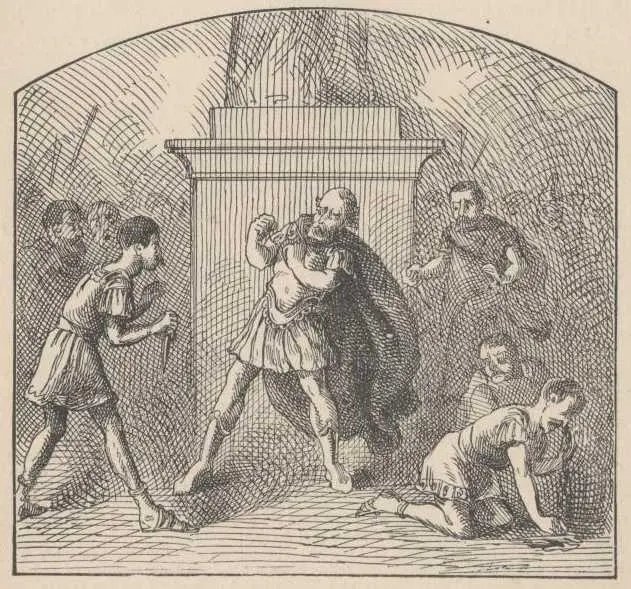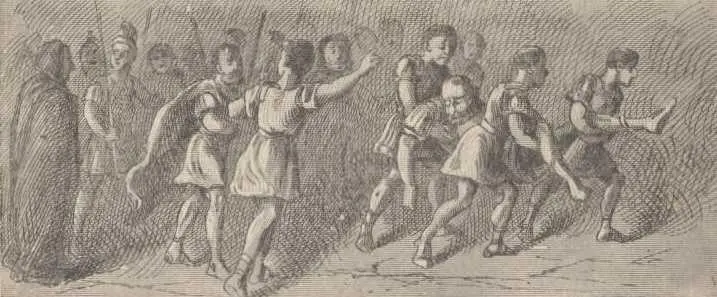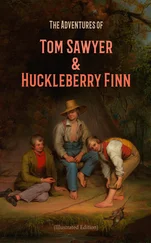We are further informed that there are many among us who think they are justified in believing that the assassination of Julius Caesar was a put-up thing—a cut-and-dried arrangement, hatched by Marcus Brutus and a lot of his hired roughs, and carried out only too faithfully according to the program. Whether there be good grounds for this suspicion or not, we leave to the people to judge for themselves, only asking that they will read the following account of the sad occurrence carefully and dispassionately before they render that judgment.
The Senate was already in session, and Caesar was coming down the street toward the capitol, conversing with some personal friends, and followed, as usual, by a large number of citizens. Just as he was passing in front of Demosthenes and Thucydides' drug store, he was observing casually to a gentleman, who, our informant thinks, is a fortune-teller, that the Ides of March were come. The reply was, "Yes, they are come, but not gone yet." At this moment Artexnidorus stepped up and passed the time of day, and asked Caesar to read a schedule or a tract or something of the kind, which he had brought for his perusal. Mr. Decius Brutus also said something about an "humble suit" which he wanted read. Artexnidorus begged that attention might be paid to his first, because it was of personal consequence to Caesar. The latter replied that what concerned himself should be read last, or words to that effect. Artemidorus begged and beseeched him to read the paper instantly!—(Mark that: It is hinted by William Shakespeare, who saw the beginning and the end of the unfortunate affray, that this "schedule" was simply a note discovering to Caesar that a plot was brewing to take his life.)—However, Caesar shook him off, and refused to read any petition in the street. He then entered the capitol, and the crowd followed him.
About this time the following conversation was overheard, and we consider that, taken in connection with the events which succeeded it, it bears an appalling significance: Mr. Papilius Lena remarked to George W. Cassius (commonly known as the "Nobby Boy of the Third Ward"), a bruiser in the pay of the Opposition, that he hoped his enterprise to-day might thrive; and when Cassius asked "What enterprise?" he only closed his left eye temporarily and said with simulated indifference, "Fare you well," and sauntered toward Caesar. Marcus Brutus, who is suspected of being the ringleader of the band that killed Caesar, asked what it was that Lena had said. Cassius told him, and added in a low tone, "I fear our purpose is discovered."
Brutus told his wretched accomplice to keep an eye on Lena, and a moment after Cassius urged that lean and hungry vagrant, Casca, whose reputation here is none of the best, to be sudden, for he feared prevention. He then turned to Brutus, apparently much excited, and asked what should be done, and swore that either he or Caesar would never turn back—he would kill himself first. At this time Caesar was talking to some of the back-country members about the approaching fall elections, and paying little attention to what was going on around him. Billy Trebonius got into conversation with the people's friend and Caesar's—Mark Antony—and under some pretense or other got him away, and Brutus, Decius, Casca, Cinna, Metellus Cimber, and others of the gang of infamous desperadoes that infest Rome at present, closed around the doomed Caesar. Then Metellus Cimber knelt down and begged that his brother might be recalled from banishment, but Caesar rebuked him for his fawning conduct, and refused to grant his petition. Immediately, at Cimber's request, first Brutus and then Cassias begged for the return of the banished Publius; but Caesar still refused. He said he could not be moved; that he was as fixed as the North Star, and proceeded to speak in the most complimentary terms of the firmness of that star and its steady character. Then he said he was like it, and he believed he was the only man in the country that was; therefore, since he was "constant" that Cimber should be banished, he was also "constant" that he should stay banished, and he'd be hanged if he didn't keep him so!

Instantly seizing upon this shallow pretext for a fight, Casca sprang at Caesar and struck him with a dirk, Caesar grabbing him by the arm with his right hand, and launching a blow straight from the shoulder with his left, that sent the reptile bleeding to the earth. He then backed up against Pompey's statue, and squared himself to receive his assailants. Cassias and Cimber and Cinna rushed upon him with their daggers drawn, and the former succeeded in inflicting a wound upon his body; but before he could strike again, and before either of the others could strike at all, Caesar stretched the three miscreants at his feet with as many blows of his powerful fist. By this time the Senate was in an indescribable uproar; the throng of citizens in the lobbies had blockaded the doors in their frantic efforts to escape from the building, the sergeant-at-arms and his assistants were struggling with the assassins, venerable senators had cast aside their encumbering robes, and were leaping over benches and flying down the aisles in wild confusion toward the shelter of the committee-rooms, and a thousand voices were shouting "Po-lice! Po-lice!" in discordant tones that rose above the frightful din like shrieking winds above the roaring of a tempest. And amid it all great Caesar stood with his back against the statue, like a lion at bay, and fought his assailants weaponless and hand to hand, with the defiant bearing and the unwavering courage which he had shown before on many a bloody field. Billy Trebonius and Caius Legarius struck him with their daggers and fell, as their brother-conspirators before them had fallen. But at last, when Caesar saw his old friend Brutus step forward armed with a murderous knife, it is said he seemed utterly overpowered with grief and amazement, and, dropping his invincible left arm by his side, he hid his face in the folds of his mantle and received the treacherous blow without an effort to stay the hand that gave it. He only said, "Et tu, Brute?" and fell lifeless on the marble pavement.
We learn that the coat deceased had on when he was killed was the same one he wore in his tent on the afternoon of the day he overcame the Nervii, and that when it was removed from the corpse it was found to be cut and gashed in no less than seven different places. There was nothing in the pockets. It will be exhibited at the coroner's inquest, and will be damning proof of the fact of the killing. These latter facts may be relied on, as we get them from Mark Antony, whose position enables him to learn every item of news connected with the one subject of absorbing interest of-to-day.

LATER:—While the coroner was summoning a jury, Mark Antony and other friends of the late Caesar got hold of the body, and lugged it off to the Forum, and at last accounts Antony and Brutus were making speeches over it and raising such a row among the people that, as we go to press, the chief of police is satisfied there is going to be a riot, and is taking measures accordingly.
Table of Contents
One of the saddest things that ever came under my notice (said the banker's clerk) was there in Corning during the war. Dan Murphy enlisted as a private, and fought very bravely. The boys all liked him, and when a wound by and by weakened him down till carrying a musket was too heavy work for him, they clubbed together and fixed him up as a sutler. He made money then, and sent it always to his wife to bank for him. She was a washer and ironer, and knew enough by hard experience to keep money when she got it. She didn't waste a penny.
Читать дальше














